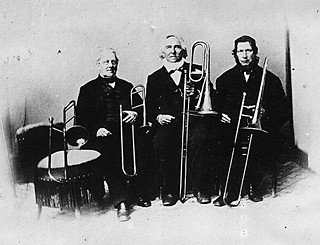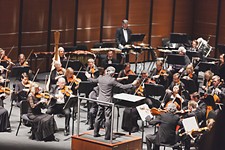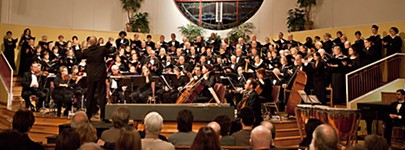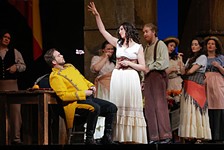American Roots: Music of the Moravians
This concert of music from the pacifist community offered a meaningful alternative to the usual July Fourth celebration
Reviewed by Natalie Zeldin, Fri., July 4, 2014
First Presbyterian Church, 8001 Mesa
June 29
The first music that comes to mind when I think of Revolutionary America is sprightly tunes played on fifes and drums. As cheerful as that music is, it was music of war. This past weekend, though, La Follia Austin Baroque performed compositions from that time that evoked peace – lesser-known music from the pacifist community of Moravians in America.
Descendants of one of the earliest religious reform movements in Europe, the Moravians endured much dislocation and persecution before settling in the American colonies in 1735. Their two primary communities were established in Salem, N.C., and Bethlehem, Pa.
The Moravians believed that a love for music was essential for spiritual life. The community kept a large library of works by the Bach family, Mozart, and Haydn, among others, and the works on La Follia's program reflected deep study of these European masters. The String Trio No. 1 by John Antes, a Pennsylvania-born composer, was so witty that it could have easily passed as a score of a London Trio by Haydn. The ensemble's performance was a clear highlight of the concert, particularly the charmingly deft duo of violin in the second movement.
The Moravians didn't simply emulate European classical music, however; they also appropriated its formal elements for their own uses. In the concert, a trombone choir demonstrated a sequence of chorales that would have been performed from the cemetery in order to alert the town of a death. The specific chorale relayed what type of person died; here, they performed "Now to the Earth," the serene chorale that signified the passing of an older girl.
The cornerstone of the program was a large-scale, cantata-like composition created to celebrate the end of the Revolutionary War. This Freudenpsalm (Psalm of Joy) was compiled by composer Johann Friedrich Peter shortly before July 4, 1783, and is considered to be the first musical commemoration of the event. As pacifists, the Moravians paid fees that allowed them to abstain from the physical fighting, but, surprisingly, they opened military hospitals where they treated Americans and Redcoats alike. The work, arranged as a celebration of the newfound peace, is celebratory but also contemplative and serious, reflecting on the difficult realities of war. Its most gut-wrenching moment was a line of recitative describing war-torn America: "The land now lies in waste, pillaged and ravaged."
Even though the Fourth is about celebration, this program forced me to reflect on how estranged we are today from the harshness of the American War of Independence. In this performance, La Follia encouraged the audience to participate in the chorale-singing, and the humble murmurs from the audience were quite moving. Unlike the physically explosive performances of Tchaikovsky's 1812 Overture that typify today's July Fourth celebrations, this thoughtful praise of peace, particularly in the company of such warm community, made for a more meaningful alternative.













